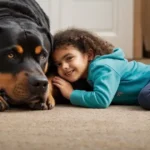So you’ve decided a Rottweiler is the right dog for you. Excellent choice! Rotties are phenomenal companions with their devoted nature, intelligence, and versatility.
But finding the perfect Rottweiler pup, one that’s healthy and has an outstanding temperament?
That can be tricky.
As an experienced Rottweiler owner, I want to skip the research and rush out to get your puppy right now! But having a systematic, thoughtful approach is essential for your future happiness together.
Trust me, finding an ethical, responsible breeder will pay off exponentially in the long run. You’ll form a deeper bond with your four-legged friend, knowing you made the best choice for their wellbeing.
This comprehensive guide has everything you need to know to find your perfect Rottie pup. We’ll cover:
- How to identify reputable Rottweiler breeders
- What to look for in a healthy, quality puppy
- Early socialization and training tips
- Preparing for your Rottweiler’s exercise, nutrition and healthcare needs
Let’s get started!
Step 1: Finding a Reputable Rottweiler Breeder
The key to a healthy, well-tempered Rottweiler lies in its breeding. Puppy mills and backyard breeders should be avoided at all costs. Instead, seek out ethical, dedicated breeders focused on improving the breed.
Get Referrals from Rottweiler and Kennel Clubs
Reach out to reputable groups like the American Rottweiler Club or regional Rottweiler clubs. Explain you’re looking for breeder referrals and ask for ones involved in showing, working, or breeding programs.
Club members are invaluable resources to point you toward breeders doing things correctly.
Confirm Health Testing and Genetic Screenings
Responsible Rottweiler breeders invest heavily in health testing to reduce the risk of hereditary conditions. Ask for proof of testing on both sire and dam for:
- Hips and elbows: Hip and elbow dysplasia are joint disorders in the breed. OFA or PennHIP certification ensures parental joints are sound.
- Heart: Congenital heart defects happen in some Rottweiler lines. Parents should be screened by a canine cardiologist.
- Eyes: Tests rule out issues like cataracts. A CERF exam by a veterinary ophthalmologist is the standard.
- Thyroid: Hypothyroidism has a genetic link to Rotties. Thyroid panels can identify at-risk dogs.
- DNA tests: Ethical breeders screen for deadly neurological conditions like JLPP (juvenile Laryngeal Paralysis Polyneuropathy).
Confirm all health testing with documentation from the evaluating veterinarians. No reputable breeder would refuse to provide them.
Analyze the Puppy’s Pedigree
Serious breeders study pedigrees extensively. Ask to see your puppy’s lineage tracking back several generations.
Look for:
- No inbreeding: Close inbreeding raises health risks and indicates a subpar breeder.
- Show and working champions: Hallmarks of a strong pedigree emphasizing breed standards and temperament.
- OFA and health certifications: Multiple generations should have passing health screens.
- Long average lifespan: 10-12 years is ideal. Shorter suggests hereditary issues.
Any pedigree gaps, numerous health issues or early deaths are red flags. Keep looking if anything seems amiss.
Beware Backyard Breeders and Puppy Mills
It’s tempting to skip the pedigree analysis and health screens for a cheaper puppy from a backyard breeder or pet store. But the long-term costs are immense.
Puppies from irresponsible sources often suffer from the following:
- Genetic health conditions cost thousands in vet bills.
- Behavioural issues from poor breeding and socialization.
- Lack of support from the “breeder” once purchased.
Always confirm where the puppy came from. Responsible preservation of the Rottweiler breed should be a top priority.
Doing your due diligence takes time but ultimately saves heartache. A couple months of researching breeders now brings years of happiness with a healthy pup down the road.
Step 2: Selecting a Healthy Rottweiler Puppy
You’ve found some stellar breeders to choose from. Next is picking the individual pup that’s right for you. Here’s what to look for:
Lively Temperament and Willingness to Play
Rottweilers are working dogs with active, attentive dispositions. Shy, timid or aggressive puppies suggest poor breeding.
Ideal pups are engaged and eager to interact. Watch how they respond to everyday sounds and stimuli. Calm curiosity and confidence are critical.
Bring a toy to see their play drive. Look for energetic tugging, chasing and shaking. Avoid puppies who ignore the toy completely.
While playing, check their bite inhibition. Puppies should respond to gentle yelps when biting too hard. Walk away from pups who get more riled up or aggressive.
Healthy Coat, Eyes, Ears and Teeth
Shiny coats, clear eyes, clean ears and complete teeth are signs of good health. Watch for:
- Dull, patchy coats – Could indicate parasites or malnutrition.
- Eye discharge – Potential corneal injury or infection.
- Dirty ears – Yeast buildup, mites or disease.
- Missing teeth – Developmental issue or trauma.
Of course, no puppy will be perfect. However, multiple issues may suggest neglect.
Proper Growth and Weight
Ask to see weight tracking since birth. Consistent gains within breed standards are ideal.
Rapid growth or obesity leads to heightened orthopaedic risks. Underweight pups may have health issues impeding proper development.
Compare proportions as well. Puppies should be slightly longer than tall before their growth plates close.
Veterinary Records
Reputable breeders will provide current veterinary records, including:
- Deworming and vaccination status
- Fecal tests for intestinal parasites
- Microchip details
- Spay/neuter agreements (if relevant)
Review the vet’s notes closely, looking for any concerns. Reach out to them with any questions.
Meeting the pup’s vet now also makes transferring records easier when you start care.
Step 3: Early Rottweiler Training and Socialization
You’ve found the perfect puppy! The real fun starts – prepping them for a lifetime as your best friend.
Investing in training and socialization early on will pay back tenfold over your Rottweiler’s life. Here’s how to set them up for success:
Prioritize Socialization
Rottweilers often get labelled as aggressive. In truth, antipathy towards strangers or other dogs stems from a lack of early socialization.
Introduce your puppy to a wide range of sights, sounds, places, and people in a controlled, positive manner. It’s a critical opportunity to shape their temperament during prime developmental weeks.
Expose them to:
- Men, women, and children of various ages and appearances. Have strangers offer treats to build positive associations.
- Other puppies and friendly adult dogs. Set up “play dates” at training classes or with known vaccinated dogs.
- Car rides, elevators, stairs, slick floors. Make new environments fun with toys and praise.
- Loud noises like claps, doorbells, vacuums, traffic. Pair with treats so they learn noises = good things.
The goal is to show your pup the world is an exciting, non-threatening place full of potential friends. Be prepared to intervene if they become fearful. Stay calm and optimistic, and keep experiences brief and rewarding.
Start Obedience Training Early
Formal training should begin when your vet clears your puppy from quarantine, usually around 16 weeks. Look for classes using positive reinforcement methods.
Prioritize socialization over perfect compliance at first. Keep sessions short and upbeat. End on a good note if your pup gets distracted or anxious.
Build their confidence with basic cues like sit, stay, come, down, and leave. Many small, tasty treats and praise will make them eager to learn.
Handy commands like “look” (make eye contact) and “settle” (calm down) are great for focusing hyper puppies, too.
Work on polite walking skills so they don’t pull on leashes. And strongly reinforce responding to their name – very important for off-leash control later!
Get Comfortable with Handling
Get your pup accustomed to being handled from day one. Touch their paws, ears, tail, muzzle and toes regularly.
Make grooming like nail trims and teeth brushing a frequent, relaxing experience full of treats and massages. It’ll make vet exams and handling easier for life.
Use Crate Training
Crate training utilizes a dog’s natural den instincts to encourage good potty habits and independence.
Set up the crate with comfy bedding and toys. Start with brief, supervised stretches inside and reward calmness.
Slowly increase duration alone, providing praise and treats upon return. Puppies can usually handle their age in months plus one hour by 6-8 months.
For anxious puppies, try covering the crate and placing it nearby for security. Never use the bin solely for punishment.
Patience and positivity are key to this essential training method. Done right, it establishes lifelong habits for safety and good behaviour when you’re away.
Step 4: Caring for Your Rottweiler’s Needs
Puppies are adorable but also exhausting! Ensuring you can provide for your Rottweiler’s needs for life is a big (but rewarding) responsibility. Here’s what to expect:
Exercise and Mental Stimulation
As working dogs, Rottweilers need lots of exercise and mental challenges. Expect to dedicate at least 30-60 minutes daily to meet these needs.
- Walks: Brisk leash walks around the neighbourhood are a staple. Jogging or hiking with older pups is excellent, too.
- Play: Fetch, tug of war, and chasing games get that energy out. Have safe chew toys on hand.
- Training: Continue obedience and trick training to occupy their bright minds.
- Socializing: Set up off-leash playdates with other vaccinated dogs. Supervise closely, especially with same-sex pairings.
Mentally and physically tired dogs also tend to be the best-behaved dogs. Set aside time daily to fulfil your Rottie’s needs, and you’ll both be happy.
Grooming:
With their short coats, Rottweilers don’t require extensive grooming. Plan on brushing one to two times per week. Use a stiff bristle brush and give extra attention to shedding seasons.
Trim nails as needed, usually every 2-3 weeks. Get them comfortable with teeth brushing early on to maintain good dental health.
Check and wipe ears weekly for dirt and pests. And don’t forget the baths! Every 4-8 weeks works for most.
Nutrition:
As large breed puppies, Rottweilers need specialized diets to support their rapid development. Look for foods formulated for growth with proper calcium/phosphorus ratios.
High-quality protein sources like chicken, fish and eggs should be first on the ingredients list. Grains and by-products are red flags.
Feed set meals based on target adult weight, limiting extras. For a 100 lb adult, start with 3-4 cups split over 3 meals from 8-12 weeks, then decrease frequency as they mature.
Keeping growth steady, lean and slow reduces joint stress. Avoid overfeeding, leading to rapid weight gain.
Once fully grown around age 2, most Rottweilers need 2-3 cups daily, adjusted based on build and activity.
Health Concerns:
Unfortunately, Rottweilers are prone to certain hereditary conditions. Stay proactive with:
- Yearly vet exams, bloodwork and eye checks.
- Hip and elbow X-rays at one year to certify joints.
- Pressure on gums daily to prevent severe gum disease.
- Skin fold cleaning – Those adorable face rolls need attention!
- Monthly Heartgard and Nexgard preventative medications.
With diligent preventative care and stellar breeding, your Rottie can beat the odds and live a wonderfully long, healthy life!
Bringing Home Your Rottweiler Puppy
I hope this guide gave you a thorough overview of finding the perfect Rottweiler puppy. While the process takes some patience, it’s gratifying to start your life together on the right paw!
You’ll be equipped to handle this exceptional breed with responsible health testing, early socialization, and training. Before you know it, you’ll have the ideal canine companion for life.
Just be ready for people asking, “Is that a baby bear??” everywhere you go. It comes with the territory of having such a magnificent, iconic dog!
Now, unleash your perfect Rottie puppy and enjoy all the fun. You’ve got this!
Conclusion
Finding the right Rottweiler puppy to welcome into your life is a big decision – and rightfully so. These incredible dogs make for devoted companions when cared for properly.
By taking the time to research breeders, evaluate litters and prepare for ownership, you set yourself and your new puppy up for success. Building a relationship on a foundation of health, training, and trust is worth the effort.
With this thorough guide, you now have the tools to navigate the puppy selection process confidently. Trust your instincts, lean on experts and don’t settle for less than you deserve.
Your ideal Rottweiler is out there waiting for you. Follow these steps, and soon, you’ll have the perfect pup to share a lifetime of joy and adventures. Happy searching!
Frequently Asked Questions
How much does a Rottweiler puppy cost?
- From a quality breeder, expect to pay $1500-$2500+ for a Rottweiler puppy. Anything significantly less should raise red flags.
At what age can Rottweiler puppies go home?
- Most reputable breeders allow puppies to go home at 8-10 weeks once weaned and vaccinated. This critical socialization period shouldn’t be disrupted.
Are Rottweilers easy to train?
- Yes, Rottweilers are very intelligent and eager to please. Early socialization and positive reinforcement training will lead to an obedient, well-mannered dog.
How much exercise does a Rottweiler puppy need?
- Rottweiler puppies need at least 30-60 minutes of activity per day. This can include play, training, socialization and short-leash walks. Avoid overexertion on developing joints.
What health issues are common in Rottweilers?
- Potential health risks to screen parents for include hip dysplasia, elbow dysplasia, heart disease, eye issues, hypothyroidism and neurological conditions.
Do Rottweilers make good family dogs?
- With proper socialization and training, Rottweilers can make excellent family companions. Supervision is still essential, especially with small children.
Are Rottweilers aggressive?
- Rottweilers have protective instincts but are not inherently aggressive. Lack of training and socialization contributes far more to temperament issues than genetics.










2 thoughts on “Choosing a Rottweiler Puppy – Tips for Finding a Healthy, Quality Dog”